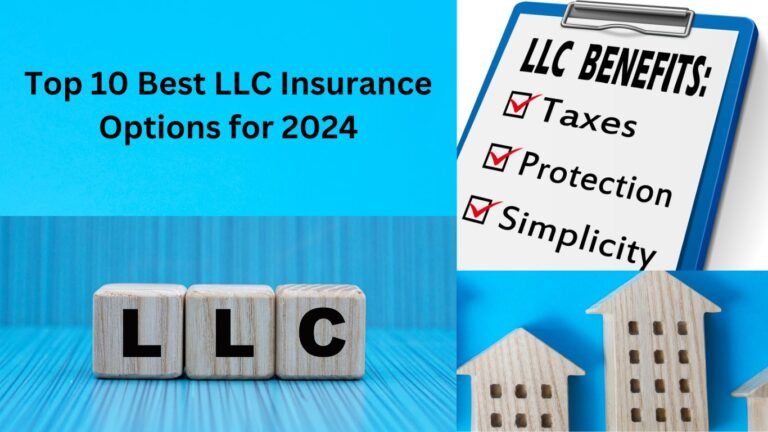LLC Small Business Insurance: Essential Information for Business Owners
Table of Contents
Introduction to LLC Small Business Insurance
LLC small business insurance is a critical component for maintaining the stability and longevity of a Limited Liability Company (LLC). This type of insurance provides a safety net against various risks and liabilities that businesses might face. For LLCs, which offer personal liability protection to their owners, having the right insurance safeguards the company’s assets and helps manage unforeseen circumstances that could otherwise result in significant financial loss.
The primary purpose of LLC insurance is to shield the business from everyday risks that could lead to legal claims or financial damage. This includes protection from lawsuits, property damage, and employee-related risks. General liability insurance, for instance, covers claims related to bodily injury, property damage, and advertising injury, ensuring that the business can continue to operate smoothly even in the face of legal challenges.
Professional liability insurance, also known as errors and omissions insurance, is another essential coverage for LLCs, especially those providing expert advice or services. This insurance protects against claims of negligence or inadequate work, ensuring that the business can defend itself without suffering financially. Commercial property insurance, on the other hand, covers physical assets like buildings, equipment, and inventory, protecting against losses due to fire, theft, or natural disasters.
Understanding and meeting LLC insurance requirements is crucial for the sustainability of the business. Without adequate insurance, an LLC may struggle to recover from accidents, legal disputes, or other unexpected events, potentially leading to severe financial difficulties or even closure. Utilizing tools like a small business insurance cost calculator can help business owners estimate the costs and plan their budgets effectively.
In essence, LLC small business insurance is not just a regulatory requirement but a strategic investment in the company’s future. By securing the appropriate coverage, LLCs can mitigate risks and ensure a stable, resilient operation, enabling them to focus on growth and success.
LLC Insurance Requirements
Understanding the specific insurance requirements for Limited Liability Companies (LLCs) is crucial for any business owner. These requirements can be influenced by federal and state mandates, industry-specific regulations, and contractual obligations. It’s important to navigate these requirements carefully to ensure compliance and adequate protection for your business.
At the federal level, there are no blanket insurance requirements for LLCs. However, certain industries may have federal regulations that necessitate specific insurance coverages. For instance, businesses involved in transportation or healthcare might need to secure particular types of liability insurance as per federal law.
State requirements for LLC insurance can vary significantly. Commonly required policies include workers’ compensation insurance, which is mandatory in most states if the LLC has employees. Additionally, professional liability insurance might be required for businesses offering professional services, such as legal or medical advice. General liability insurance, while not always mandated by law, is highly recommended to protect against common risks such as property damage or bodily injury.
Industry-specific requirements also play a significant role. For example, construction companies often need surety bonds, while restaurants might be required to carry liquor liability insurance. These requirements ensure that businesses within high-risk industries are equipped to handle potential claims and liabilities.
Contractual obligations can further dictate the insurance needs of an LLC. Clients, landlords, or lenders may require proof of certain insurance coverages before entering into agreements. For instance, a landlord might mandate commercial property insurance as a condition of the lease, or a client might require professional liability insurance before signing a contract.
The nature and location of your LLC’s business operations will influence the specific insurance requirements. It’s advisable to consult with an insurance professional or legal advisor to ensure that your LLC meets all necessary insurance obligations. Utilizing tools like a small business insurance cost calculator can also help in budgeting for these expenses and understanding the average cost of business insurance relevant to your industry and location.
Do You Need Business Insurance for an LLC?
Forming a Limited Liability Company (LLC) is a popular choice for small business owners due to the protection it offers against personal liability. However, many wonder if they need business insurance for their LLC. The simple answer is yes, business insurance is highly beneficial and often necessary to protect the business and its owners from various risks.
One of the primary reasons to consider LLC small business insurance is to protect personal assets. While an LLC itself limits personal liability, there are scenarios where personal assets could still be at risk. For instance, if an LLC is sued and the business does not have enough assets to cover the judgment, personal assets may be targeted. Business insurance can serve as a financial buffer, covering legal fees and settlements, thus safeguarding personal wealth.
Moreover, business insurance is crucial for covering legal fees. Legal disputes can arise from a multitude of situations, such as employee grievances, contract breaches, or customer complaints. Without insurance, the cost of legal defense and potential settlements can be financially devastating for an LLC. Having the right insurance policy ensures that these costs are covered, allowing the business to navigate legal challenges without jeopardizing its financial stability.
Another significant aspect is dealing with claims from customers or clients. Whether it’s property damage, personal injury, or professional errors, claims can result in substantial financial burdens. Progressive LLC insurance options typically provide coverage for these incidents, ensuring that the business can handle claims without substantial out-of-pocket expenses.
Operating without insurance exposes an LLC to potential risks that could impact its long-term viability. Unforeseen events such as natural disasters, theft, or accidents can disrupt operations and lead to significant financial losses. Insurance policies tailored for small businesses help mitigate these risks, providing a safety net that supports business continuity.
In essence, while an LLC provides a level of protection, business insurance is essential to cover gaps and additional liabilities. Utilizing tools like a small business insurance cost calculator can help business owners understand start-up business insurance costs and the average cost of business insurance, enabling them to make informed decisions about the necessary coverage for their LLC.
Does an LLC Need Insurance?
Determining whether an LLC requires insurance is a nuanced process, contingent on several variables such as the business’s size, industry, and specific risk profile. Generally, while Limited Liability Companies (LLCs) offer a degree of personal liability protection, this does not eliminate the need for business insurance. The necessity of insurance for an LLC can be influenced by the potential risks and liabilities associated with its operations.
For instance, small businesses operating in high-risk industries like construction or healthcare are more likely to require comprehensive insurance coverage. Progressive LLC insurance policies can provide tailored solutions to mitigate these risks effectively. Conversely, an LLC in a low-risk industry, such as consulting, might not need as extensive coverage but should still consider general liability insurance to protect against potential claims.
The size of the business also plays a critical role. A small LLC with minimal employees and low operational risks might manage with basic coverage, such as general liability and property insurance. However, as the business expands, additional coverage types, including workers’ compensation and professional liability insurance, become necessary to safeguard the company from more complex risks.
Another factor to consider is the specific risk profile of the business. Start-up business insurance costs can be a significant consideration for new LLCs, but the investment is crucial for long-term sustainability. Utilizing tools like a small business insurance cost calculator can help business owners understand the average cost of business insurance and budget accordingly.
There are scenarios where an LLC might operate without certain types of insurance, but this approach comes with substantial risks. Uninsured claims can lead to severe financial consequences, potentially outweighing the costs saved by forgoing insurance. Therefore, it is generally advisable for LLCs to maintain at least basic coverage to ensure comprehensive protection against unforeseen events.
Progressive LLC Insurance Options
Progressive offers a range of insurance options tailored specifically for LLCs, providing comprehensive protection for various business needs. One of the primary coverage options available is general liability insurance, which shields your business from claims of bodily injury, property damage, and personal injury that could arise during business operations. This type of insurance is essential for any LLC, as it helps manage risks and maintain the company’s financial stability.
Another critical coverage offered by Progressive is professional liability insurance, also known as errors and omissions insurance. This policy is particularly beneficial for LLCs that provide professional services or advice. It covers legal expenses and damages resulting from claims of negligence, mistakes, or failure to deliver services as promised. This ensures that your business can continue to operate smoothly even in the face of potential lawsuits.
For LLCs that rely on vehicles for their operations, Progressive provides commercial auto insurance. This coverage protects your business from the financial impact of accidents involving company-owned vehicles. Whether your LLC uses cars, trucks, or vans, commercial auto insurance covers liability, physical damage, medical payments, and uninsured motorist coverage, helping to keep your business moving forward without interruption.
Choosing Progressive for your LLC insurance needs comes with several benefits. Their customer service is highly regarded, offering support and guidance throughout the policy selection and claims process. Progressive’s claims process is streamlined and efficient, ensuring that your business can get back on track quickly after an incident. Additionally, Progressive offers various discounts and packages tailored for small businesses, helping to reduce the overall cost of insurance. By using tools like a small business insurance cost calculator, LLC owners can estimate their insurance expenses and select the most cost-effective coverage options.
Overall, Progressive’s diverse range of insurance products, coupled with their excellent customer service and competitive pricing, makes them a strong choice for LLCs seeking reliable and comprehensive business insurance solutions.
Small Business Insurance Cost Calculator
When operating an LLC, understanding and managing your insurance expenses is crucial for effective financial planning. A small business insurance cost calculator is an invaluable tool designed to help LLC owners estimate their insurance costs accurately. By inputting relevant details about your business, this calculator provides an approximate cost, enabling you to budget more effectively and avoid unexpected financial burdens.
Using a small business insurance cost calculator is straightforward. First, gather essential information about your LLC, such as the nature of your business, the number of employees, annual revenue, and the specific types of insurance coverage you require. This information is critical as it directly influences the insurance rates and premiums. Once you have this data, enter it into the calculator.
The cost calculator will typically ask for details including:
- Business Type: Industry-specific risks can affect insurance costs significantly.
- Number of Employees: More employees generally mean higher premiums.
- Annual Revenue: Higher revenue can indicate a higher risk, impacting the cost.
- Coverage Needs: Types of coverage such as general liability, workers’ compensation, and property insurance.
After entering these details, the calculator will process the information and provide an estimated cost for your LLC’s insurance needs. This estimation helps you to anticipate and allocate funds appropriately, ensuring you are financially prepared.
Moreover, a small business insurance cost calculator is beneficial for ongoing financial planning. By regularly updating the information, you can monitor how changes in your business affect your insurance costs. This proactive approach allows you to adjust your budget and coverage as your LLC evolves.
In conclusion, utilizing a small business insurance cost calculator is a practical step for LLC owners. It not only helps in estimating and managing insurance expenses but also enhances overall budgeting and financial stability, ensuring that your small business is well-protected and financially sound.
Start-Up Business Insurance Costs
For start-up LLCs, understanding the cost of business insurance is crucial for effective financial planning. The cost of insurance for a new business can vary significantly based on various factors, including industry, location, the number of employees, and the specific risks associated with the business operations. Typically, start-up business insurance costs are comprised of initial premiums, ongoing costs, and additional fees.
Initial premiums are the upfront payments made to secure coverage. These can range widely depending on the type of insurance policy purchased. For example, general liability insurance, which protects against common risks like bodily injury or property damage, might cost a start-up between $400 to $1,500 per year. If the business involves higher risks, such as construction or manufacturing, the premiums could be substantially higher.
Ongoing costs include the regular payments made to maintain the insurance coverage. These are usually divided into monthly or annual payments. Some insurers may offer discounts for annual payments, which can help reduce the overall cost. Additionally, start-up businesses may face additional fees, such as administrative fees or charges for adding endorsements to their policies. It’s essential to review the policy details to understand all potential costs fully.
To minimize insurance costs without compromising on essential coverage, start-ups can adopt several strategies. Bundling multiple policies with the same insurer can lead to significant discounts. For instance, combining general liability insurance with property insurance can be more cost-effective than purchasing them separately. Another approach is choosing higher deductibles. While this means the business will pay more out-of-pocket in the event of a claim, it can lower the premium costs considerably.
Utilizing tools such as a small business insurance cost calculator can also provide valuable insights. By inputting specific business details, these calculators can estimate the average cost of business insurance tailored to the start-up’s needs. This can assist business owners in budgeting and identifying the most cost-effective insurance solutions for their LLC.
Average Cost of Business Insurance
The average cost of business insurance for LLCs varies widely due to several influencing factors. According to industry data, small businesses might expect to pay between $500 and $3,000 annually for comprehensive coverage. These premiums can differ significantly based on the type of insurance, such as general liability, professional liability, and property insurance, and are further segmented by industry, business size, and geographic location.
For instance, a small retail business in a low-risk area might pay around $750 per year for general liability insurance, whereas a construction company operating in a high-risk region might see premiums closer to $3,500 annually. Similarly, professional services, such as consultants or accountants, often have lower premiums compared to industries like manufacturing or healthcare, which face higher risk exposures.
Several factors influence the cost of LLC small business insurance. One crucial factor is the claims history of the business. Companies with a history of frequent or severe claims are often deemed higher risk, leading to increased premiums. Risk exposure also significantly impacts insurance costs; businesses operating in high-risk industries or locations will typically face higher premiums. Additionally, coverage limits play a vital role; higher coverage limits usually result in higher premiums.
LLC owners looking for affordable insurance options should consider a few practical strategies. First, comparing quotes from multiple insurers can help identify the most cost-effective policies. Online tools like a small business insurance cost calculator can be particularly useful in estimating potential costs. Additionally, bundling different types of insurance policies with the same provider often results in discounted rates. Finally, maintaining a good claims history by implementing robust risk management practices can help keep insurance costs manageable over time.
Understanding the average cost of business insurance and the factors that influence it is essential for LLC owners. By taking proactive steps to manage risks and compare insurance options, business owners can secure the necessary coverage at a price that fits their budget.








2 Comments